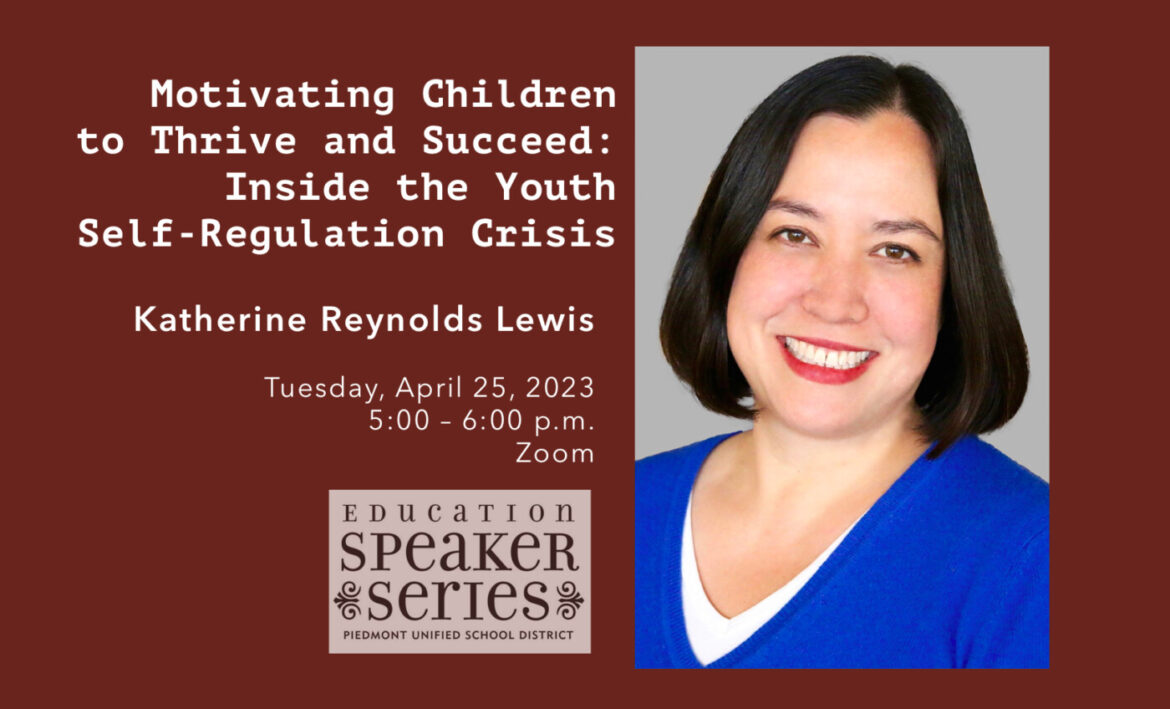The final event in the Piedmont Education 2022-23 Speaker Series on April 25 presents award-winning journalist, speaker and author Katherine Reynolds Lewis on “Motivating Kids to Thrive and Succeed: Inside the youth self-regulation crisis.” Lewis will introduce the science and findings behind rising rates of negative mental health conditions in today’s children, and will focus on how parents, guardians, and teachers can learn the best tools for building with their children or students the self-regulatory skills essential for mental health.
Lewis is the author of “The Good News About Bad Behavior: Why Kids Are Less Disciplined Than Ever – And What to Do About It”. Her essays and op-eds have appeared in The Atlantic, Mother Jones, the New York Times, Parents, Washington Post, Working Mother, and more. She is a Harvard physics graduate and lives in the Washington D.C. area with her husband Brian and their three children.
In a phone interview prior to her appearance in Piedmont, Lewis says there is no time machine for a controlled study that might cast a net over the past 25 years to determine which forces — environmental, social, technological, systemic, cultural, financial—have had greatest impact on children’s declining self-regulatory skills. What is available and has been studied and documented are three correlational, not causal influences that include shifts in what constitutes playtime, proliferative mass and social media’s affect on self-identity, and family values skewed toward competition and achievement.
“Unstructured play is the work of childhood and how [kids] learn to manage their big feelings, solve problems of communication, understand the world. Secondly, there’s the growth of mass media and social media; I don’t want to demonize what can be a lifeline, especially for marginalized kids, but It’s an extrinsic focus on looking to see ‘Am I ok?’ The third factor is that kids are unemployed. They tend not to have household jobs or jobs after school because their household has become all about achievement. If they don’t have a way to contribute every day, they have no sense of whether or not they matter. If the focus is on how well you kick a soccer ball or ace a test, there’ll always be someone who can kick it farther.or receive a higher score: it’s a never-ending race.”
In a 2018 article in New York Magazine’s The Cut, Lewis writes about the issues underlying the escalating self-regulatory deficits she observes first-hand in her children’s peer group and was researching:
This apparent bad behavior often stems from an underlying problem with self-regulation, whether an attention disorder (poor impulse control and focus), anxiety (resistance to transitions or activities that spark fear), or depression (refusing to engage in school or chores). A stunning one in two children will develop a mood or behavioral disorder, or substance addiction, by age 18, according to the National Institute of Mental Health. Even children who don’t have a diagnosis show less cooperation with other kids or adults than in previous generations, according to hundreds of conversations I’ve had with parents, educators, and scientists.
Can Scientists Tell Me If I’m a Good Mom? What happened when a team of neuroscientists observed my daughter and me, New York Magazine, April 17, 2018
She goes on to say that this generation of children and young people are desperate to gain control of their emotions, thoughts, and behavior. For youths’ long-term mental health, it is vital that adults support them with sensitive and informed parenting and knowledgeable educators.
Zooming in on the topic of parents’ possible over-pathology of children’s mental health conditions and the labels often assigned (oppositional defiant disorder (ODD), attention- deficit/hyperactivity disorder (ADHD), reactive attachment disorder, and more), Lewis says she is often asked by parents if their children are over-diagnosed. She agrees that danger exists, but so does research showing kids’ mental health and self-regulation is deteriorating. “My book looks at research and evidence and has two compelling studies. One study in my book conducted in Russia (and published only in Russian), timed kids standing still and then did it later, with modern preschoolers and found they had one-third to one-quarter the ability than (the prior group) to stand still. Another study looked at youth suicide rates, which is now at three to four times the rate of a decade ago.”
If there is positive outgrowth and response coming out of the pandemic, when children’s mental health suffered astonishing blows, it is that adults for the first time aren’t fighting about whether or not their kids need more mental health support. “As much as we’re sort of back to normal, we’ve not fully reckoned with the universal trauma. Even in the workplace, people were stretched thin. Kids are such social animals. They need to be together and learn from each other. The hardest message for parents to accept is that we cannot do it for our kids, by pushing, or with incentives or punishments. Parents want to help their child reach goals, ace the test, get on the team, win the art contest. If they can allow their kids to develop on their own steam, they avoid the damage done by riding them to commit to more than they are inclined to do on their own.”
Katherine Reynolds Lewis on MOTIVATING CHILDREN TO THRIVE AND SUCCEED: INSIDE THE YOUTH SELF-REGULATION CRISIS takes place Tuesday, April 25, 2023, 5:00 – 6:00 p.m. via Zoom. ESS members will be sent a link prior to the talk. You can still purchase tickets for $30 HERE.
